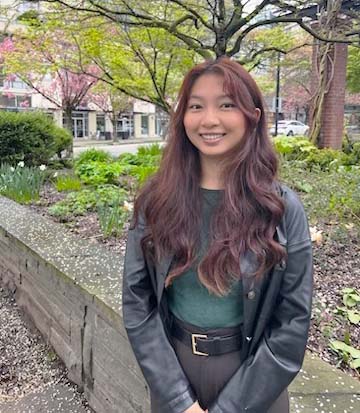"Take this chance to connect with your co-workers and supervisors! Your co-workers have a wealth of knowledge to share and are more than happy help you in your own journey.
As a student, this is an incredible opportunity to apply your learning beyond the classroom and figure out your passions."
What is your field of study?
I am pursuing a Combined Honours in Biochemistry and Forensic Science. I plan to graduate in May of 2025.
Why did you choose to enroll in Co-op?
I initially heard about the co-op program through my older cousin, who had a positive experience with UBC and the Arts Co-op program. I investigated the benefits of co-op education, because of their recommendation, and it seemed like a no-brainer to apply.
As a third-year student, I was also concerned about the post grad job search and being able to access a job relevant to my field, without solid connections or experience. Co-op seemed like a great way to gain relevant experience, strengthen my resume and figure out which aspects of my field I truly enjoy. It connected me to opportunities that I might not have been able to access on my own and valuable advice from seasoned Co-op Coordinators.
Which positions did you work during Co-op?
I am currently working at Virogin Biotech for my first placement.
Virogin is a company focused on the development of novel oncolytic virotherapies. I’m employed as a Research Assistant under their Molecular Biology and Virus Production Team!
Can you tell me a little more about your work at Virogin Biotech as a research assistant, starting with explaining what novel oncolytic immunotherapies/mRNA vaccines are?
mRNA vaccines are now extremely well-known, due to the Covid-19 pandemic.
It utilizes a small piece of genetic material – called the messenger RNA – which is delivered into the system where the recipient’s body will use it to produce the pathogen. From there, the body will recognize this foreign pathogen and build a strong immune response including antibodies and T-cells. It's essentially priming the body to recognize the pathogen in the future, should the cell become infected with the real thing.
For the most part, Virogin’s team in Canada is focused on the development of oncolytic viruses (OVs). OVs are a form of immunotherapy that are designed to directly kill the tumour cells and induce an anti-tumour immune response. They are modified viruses engineered to selectively infect and replicate in cancerous cells, whilst leaving healthy cells alone. Furthermore, they can be designed to release therapeutic transgenes (payload) to enhance the immune response against the tumour.
At Virogin, a modified HSV-1 platform has been developed with transcription & translation dual regulation of enhanced viral replication. The virus also delivers a cytokine payload to stimulate a stronger anti-tumour response. Virogin is currently working to develop new targets and therapies, as well as complete clinical trials of existing products.
Are there any types of cancer that are hoped to be more treatable/preventable with oncolytic viruses?
As of now, there is only one oncolytic virus overall that has been approved for the treatment of advanced stage melanoma by the FDA.
However, many companies, including Virogin, are in the process of clinical trials for OV treatment of different forms of cancer. Virogin is currently operating clinical trials against various types of cancers, including hepatic and pancreatic cancers.
Most of our company’s products are currently going through clinical trials and more testing needs to be completed in order to determine the overall positive impact of OVs on a patient’s cancer prognosis.
Can you explain the types of work that you did which contributed to the research or testing of oncolytic viruses?
My team’s work is centered around producing the constructs of interest in bacteria.
My team and I will clone DNA sequences of interest into plasmids, arranging them in a desired design.
These newly designed plasmids are then transformed into competent bacterial cell lines, which are left to replicate. Once the bacterial culture has grown enough, we extract the plasmid DNA to confirm that we created the expected product by performing diagnostic testing and sequencing. We eventually produce a larger quantity of the plasmid DNA to be used in downstream testing.
Once it passes testing by other teams, the DNA fragment of interest is inserted into a Bacterial Artificial Chromosome, which is then transfected into mammalian cells, which eventually produce the therapeutic oncolytic virus. Essentially, our work kick-starts the production of the therapeutic viruses and downstream testing.
Can you share your favourite experience while in Co-op?
I was fortunate enough to be able to meet two of the previous co-op students employed in my position. One of them happened to be an upper year student also studying Biochemistry and Forensic Science, which was cool considering our very small program size.
It was interesting to chat with them about how this placement influenced their next co-op position and future career plans. This meeting occurred early on, and really helped alleviate some of the uncertainty I was feeling. It was also nice to witness the interpersonal relationships they built at Virogin that extended beyond their time here.
What was your best achievement in Co-op?
My most notable accomplishment during my time in the laboratory was my significant growth in self-assurance and ability to work independently.
At the beginning of my work term, I was rather apprehensive about conducting research tasks without checking with my supervisor every step of the way. As I continued in this environment and faced various challenges, I gradually developed a stronger sense of confidence in my capabilities. This newfound independence has shifted the way I am able to approach my current work and I am confident it will help me with future opportunities.
What did you feel most challenged by and how did you overcome it?
Co-op was my first wet lab experience beyond the lab courses in school. At first, it felt very overwhelming and intimidating. I was used to spending about three hours per week in a lab course, but now it became my nine to five! I felt bombarded with new terminology, concepts and protocols -- it seemed impossible to retain all the knowledge.
I decided to take the time to independently review my learning at the end of each day and identified areas where I needed clarification. With the continuous support of my supervisor, I felt more prepared to make sense of the information and adjust to workflow of the lab.

How do you feel Co-op helped your personal growth?
Although I have worked numerous jobs prior to this position, none were directly related to this industry. Co-op exposed me to a different work environment with new and unique challenges. I had to learn to adapt quickly to succeed and step outside of my comfort zone to handle new responsibilities.
Being in co-op also improved my understanding of financial literacy. Having to handle income and expenses taught me valuable financial management skills. I'm learning to budget, save and invest my income. It also helps that my supervisor happens to be very passionate about this subject!
How do you feel Co-op has helped your career?
I joined co-op to gain more insight into the industry and to help clarify my career goals. Through this position, I met numerous co-workers, scientists and managers - all with great advice to share. It was interesting to hear about their own academic paths, how they got to their current positions and if they would’ve done anything differently with the experiences and perspectives that they have now. This is an invaluable source of information and I will apply their advice on my own career journey.
What advice would you offer future Co-op students?
Take this chance to connect with your co-workers and supervisors! Your co-workers have a wealth of knowledge to share and are more than happy help you in your own journey. As a student, this is an incredible opportunity to apply your learning beyond the classroom and figure out your passions.
Every co-op experience will be unique and can be amazing learning opportunity. It is okay to not enjoy every aspect of your placement but what is important is that you make the most of it. Don’t be afraid to ask questions and build connections with industry professionals.
Co-op is a starting point for so many opportunities; I highly recommend interested students take advantage of this unique program.
What are you looking forward to after graduation?
Through co-op, I feel more confident in my aspirations and ability to pursue a rewarding career. I look forward to finding my place in the industry and continuously learning from those around me.


